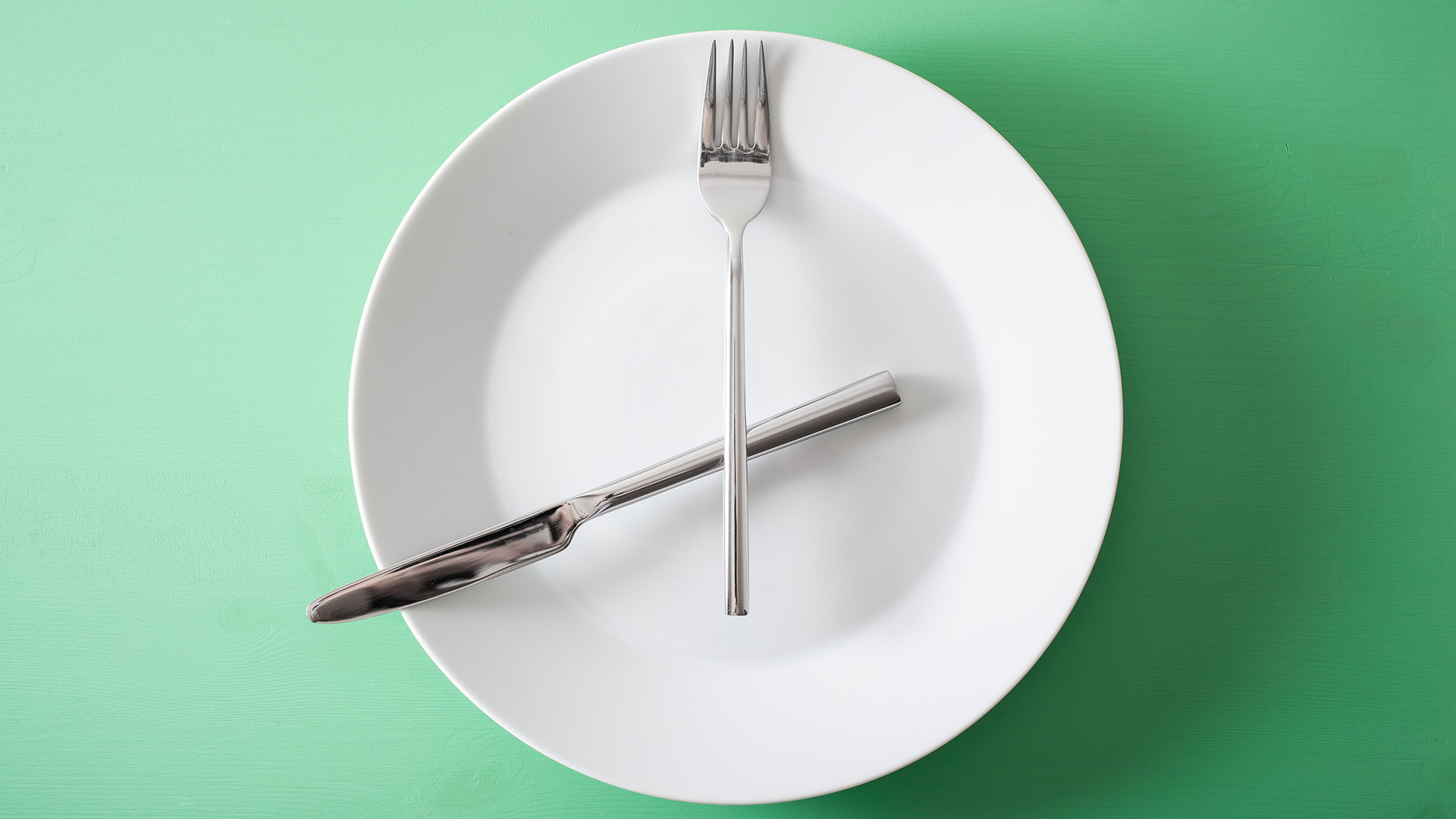What you'll learn here |
We know that navigating health and weight changes can be challenging, especially as we get older. And while ageing is a privilege, it often brings some unwanted effects like lower energy levels, weight gain, and even age-related muscle loss—particularly for postmenopausal women.
But here’s the good news. All of this is completely normal, and you’re not alone. Plus, you don’t need to just accept these biological changes as inevitable parts of ageing. No, you can make positive changes to lessen their effects—and take control of your health.
For many women over 50, an intermittent fasting diet is a simple and effective way to lose weight and improve metabolic health.
In this intermittent fasting guide, we'll take a deep dive into this weight loss approach with reliable and scientifically backed info on how it works—and if it’ll work for you.
Are you ready to begin? Let's dive in.
What is intermittent fasting, exactly?
Intermittent fasting (IF) is a way of structuring when you eat rather than focusing solely on what you eat.
It’s not about skipping meals and achieving weight loss in an unhealthy way but about cycling between periods of eating and fasting.

During fasting periods, the body switches gears and uses stored fat for energy, which can lead to weight loss, a boost in metabolism, and stable energy levels throughout the day. But we’ll get into its benefits later.
The main types of intermittent fasting uncovered
There are several popular intermittent fasting approaches, and it's important to find a method that suits your lifestyle and body needs( if fasting is for you, that is).
Let’s check out the most common methods…
16:8 Method
This method involves fasting for 16 hours and eating all your meals within an eight-hour window.
For example, you might eat between 12pm and 8pm skipping breakfast. This is one of the most popular and sustainable methods, ideal for beginners.
5:2 Method
With this method, you eat normally for five days a week and restrict your calorie intake (usually around 500 to 600 calories) on two non-consecutive days.
It’s a flexible option if you don't want to fast daily but still want the benefits of intermittent fasting.
Alternate-day fasting
As the name suggests, alternate-day fasting involves fasting every other day.
On fasting days, you might eat very little or nothing at all, while on non-fasting days, you eat normally. While effective for some—this approach to fasting can be quite challenging to maintain.
Read: Unlock Your Ideal Sustainable Weight Loss Rate
How does intermittent fasting work?
The science behind intermittent fasting lies in the way your body shifts between two metabolic states: the “fed” state (after eating) and the “fasted” state (between meals).

When you're in the fed state, your body uses glucose from food for energy. But when you're fasting, your insulin levels drop, and your body starts to burn stored fat for energy instead.
What are the benefits of intermittent fasting?
Intermittent fasting isn’t just a buzzword—it’s backed by research and used by many, especially menopausal women and those 50+, as a way to take charge of their health.
It has a ton of health benefits you may not know, so let’s dive into all its positives and discuss what it can do for weight management, body composition and more.
No complicated calorie counting
With intermittent fasting, you're naturally eating fewer calories by sticking to set eating windows. This can help reduce body fat and manage body weight without having to track every bite you take.
And let’s be honest—who wants to spend their day obsessing over every calorie?
Focusing too much on calorie counting can lead to unhealthy eating patterns and negative feelings about food, turning something essential into a source of stress.
Better metabolic health
Intermittent fasting encourages your body to burn fat for fuel, which can lead to weight loss and significant metabolic benefits.
Intermittent fasting helps the body efficiently manage blood sugar, burn fat, and regulate energy by giving it a break from constant food intake.
This process reduces the risk of developing conditions like diabetes, heart disease, and obesity.
Studies also show that intermittent fasting helps improve insulin sensitivity, making it easier for your body to regulate blood sugar and burn fat.

This can be especially good if you are over 50, as you may experience a natural decline in insulin sensitivity due to changes in hormone levels and stubborn belly fat as a result.
Maintain lean muscle mass
Losing lean muscle mass is a natural part of ageing. But intermittent fasting, combined with a good protein intake, can actually help you maintain muscle mass while shedding fat.
This is because protein intake supports muscle repair and growth, which maintains leanness while reducing your overall body fat.
So you’re not just losing weight—you’re keeping the strength you need to stay active. It's a win, win!
Heart health
The benefits of intermittent fasting aren't just skin-deep.
Research indicates that this type of fasting can reduce risk factors for heart disease, including lowering blood pressure and improving cholesterol levels, as opposed to an eight-hour eating window.
Easier eating patterns
Instead of feeling restricted, many find that intermittent fasting offers flexibility.
Whether you’re following a 16:8 or 5:2 fasting schedule, you can adapt it to fit your lifestyle.
It’s not about deprivation—it’s about structure, which can help avoid overeating or developing unhealthy eating habits. Fast on your terms, and the results will follow.
Longevity & disease prevention
There's ongoing research suggesting that fasting can promote longevity and help prevent chronic diseases.
Improved metabolic health and reduced inflammation may lower the risk of conditions like heart disease and type 2 diabetes.
Mental clarity & focus
Intermittent fasting can actually boost your focus and energy levels.
This is partly because fasting helps stabilise blood sugar levels, which can prevent that dreaded afternoon slump.
When your levels are more balanced, you’re less likely to experience sudden crashes that can leave you feeling drained.
Gut health boost
Another great benefit is how it can help balance your gut microbiome.
Your gut is home to trillions of bacteria, some good and some not-so-good, and keeping these in balance is key to maintaining ideal gut health—think clear skin, smooth digestion, and overall wellbeing.
Fasting gives your gut a much-needed break, allowing it to rest and reset.
Read: Foods that heal the guts
Personalise your fasting plan
As you can see, while fasting offers an impressive range of health benefits, it’s still really important to adjust it to your personal needs.
For example, if you’re new to fasting or find long fasting periods too difficult, you can start with a shorter fasting window, like 12:12 (12 hours of eating, 12 hours of fasting), and gradually build up to longer periods like 16:8.
Listen to your body—if you’re feeling overly fatigued or noticing negative side effects, consider a different fasting method or modify the length of your fasting periods.
Intermittent fasting isn’t a one-size-fits-all situation…
If you’re 50+ and especially if you’re in postmenopausal stages, you may need to be more mindful of your body’s unique responses to fasting.
Consulting with a healthcare provider before starting any fasting routine is always a good idea, particularly if you have underlying health conditions.
Should I try intermittent fasting?
Here’s the big question when it comes to fasting— is it the right choice for you?
If you’ve dealt with eating disorders in the past, intermittent fasting might not be the best fit since it could bring up old habits or unhealthy thoughts about food.
Plus, if you’ve got issues like low blood sugar or insulin resistance, fasting could make those worse, leading to things like energy dips or trouble keeping your blood sugar steady. You wouldn’t want fasting to create psychological triggers.

It's all about finding a way to manage your weight that feels good both physically and mentally.
But, for those who are generally healthy and looking for a structured way to manage their weight, fasting could be a great choice.
Remember, the key to successful weight management is finding an approach that works with your body and lifestyle, not against it.
Tips for intermittent fasting for women over 50
If you’ve decided you want to try fasting we’ve got the tips you need to take on this new approach healthily and gradually.
1. Start slow and listen to your body
Specifically for women over 50, your body’s needs are unique—not in a negative way, but because you're in a transitional period.
This stage of life brings its own set of challenges and opportunities, and your approach to health, including intermittent fasting, should reflect that transition.
It’s important to start with a more gentle approach, like the 12:12 method (12 hours of fasting, 12 hours of eating), before moving on to more extended fasting periods like 16:8.
Pay close attention to how your body reacts, especially in terms of energy levels, mood, and hunger.
2. Eat plenty of nutrient-dense foods
During your eating windows, focus on nutrient-dense foods that support your energy levels and health in general.
Think lean proteins, healthy fats, fibre-rich vegetables, and whole grains. Since your body’s ability to absorb nutrients can change with age, it’s even more crucial to choose foods that pack a nutritional punch.
Read: 10 healthy fat-burning snacks for women

3. Keep up the water
As you adjust to fasting, staying hydrated is key.
Drink plenty of water throughout the day, and consider calorie-free drinks like herbal teas or black coffee during your fasting periods to keep yourself refreshed and prevent dehydration.
Did you know? Our sense of thirst diminishes with age, which can make it harder to recognize when we need fluids. This can lead to unintentional dehydration if we're not mindful of our water intake.
Read More: Does drinking water help you lose weight?
4. Don’t skip out on protein
As we’ve mentioned, maintaining muscle mass becomes increasingly important as we age.
Make sure you’re getting enough protein during your eating windows to support muscle health and prevent muscle loss.
Consider including a protein shake if you’re struggling to meet your protein needs through food alone.
5. Be realistic
Intermittent fasting is a lifestyle change, not a quick fix.
Set realistic and sustainable goals, whether that’s weight loss, improved metabolic health, or simply feeling more energised.
Celebrate small victories along the way, and remember that consistency is key.
6. Be aware of how fasting affects hormones
Fasting can influence hormone levels, especially for postmenopausal women. Postmenopausal women may experience changes in oestrogen and progesterone that can affect metabolism and mood.
Also, monitor how your fasting schedule impacts your sleep, as fasting can disrupt it—and check in with how you feel and your energy levels throughout this transitional period.
7. Consider your lifestyle
Intermittent fasting should complement your lifestyle, not disrupt it.
Choose a fasting schedule that fits around your daily activities and social life. If you have a busy morning routine, for example, a 10:6 eating window might work better for you than skipping breakfast entirely.
8. Check in with your healthcare provider
Before making any significant changes to your diet or fasting routine, it's vital to check in with your healthcare provider when it comes to any dietary changes.
9. A long-term lifestyle change
Remember, intermittent fasting is about making sustainable, long-term changes rather than quick results.
Focus on how it fits into your lifestyle, including regular exercise, mindful eating, and self-care practices that support your wellbeing.
For more on the best fasting diet for weight loss and other topics like nutrition, exercise, lifestyle and beyond, check out The PhenQ blog.
We’re with you every step of the way.




